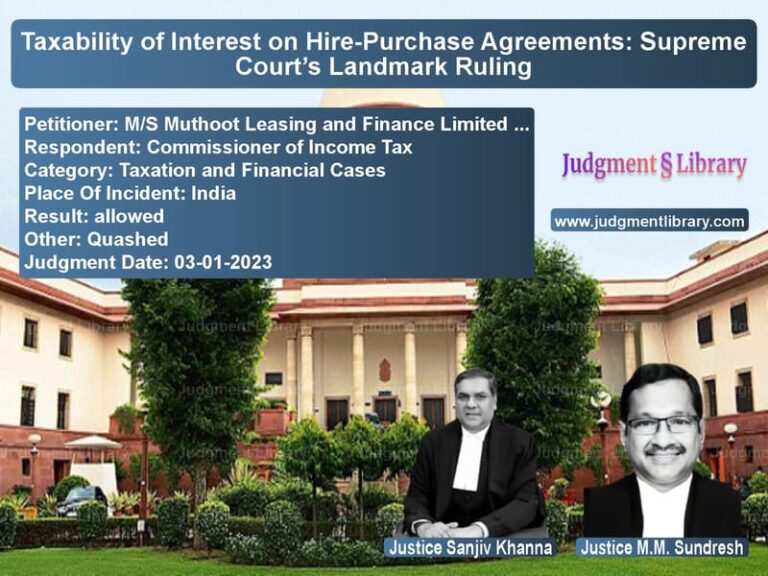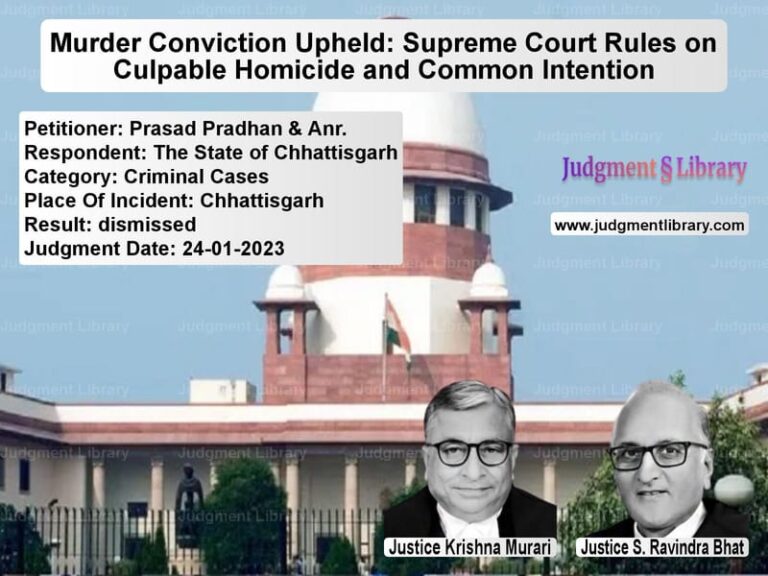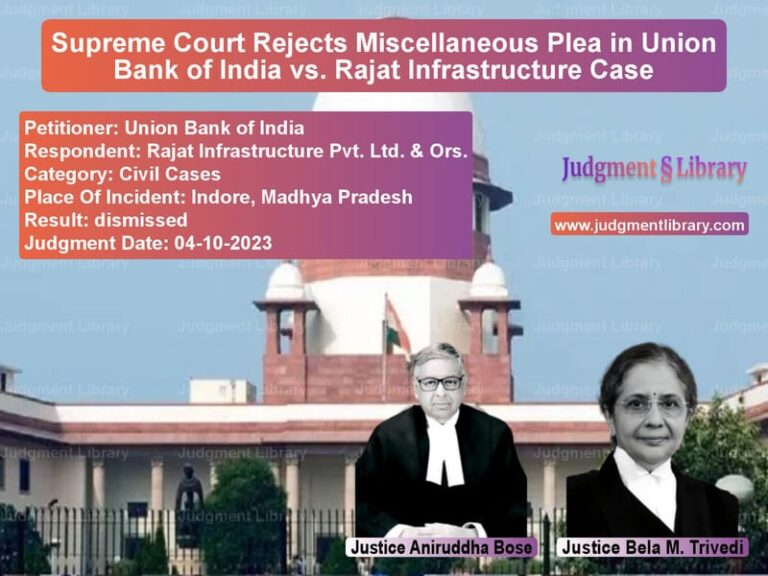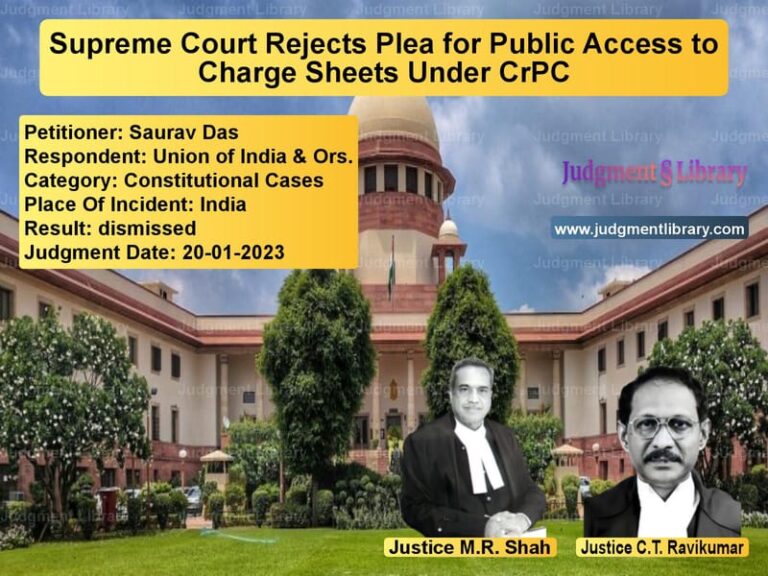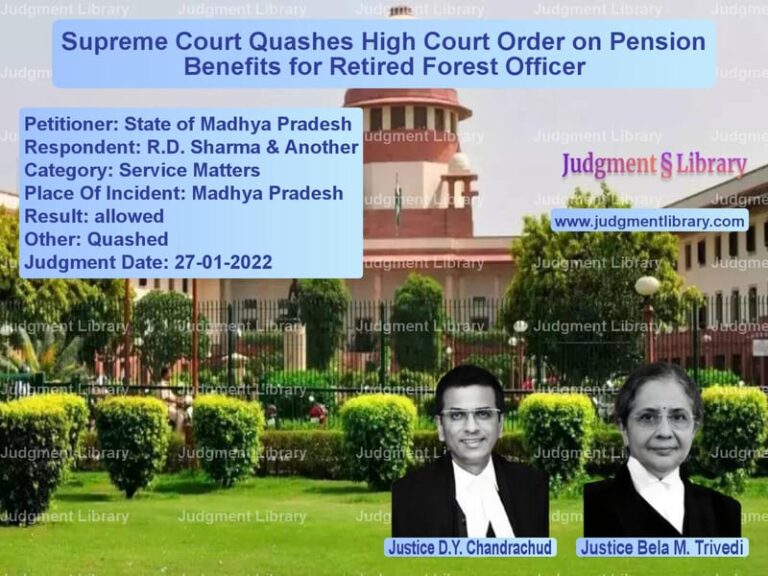Supreme Court Rules on Maintainability of Suit by Unregistered Partnership Firm
The Supreme Court of India, in a significant judgment in Sunkari Tirumala Rao & Ors. v. Penki Aruna Kumari, ruled that a suit filed by partners of an unregistered partnership firm for recovery of money is not maintainable under Section 69(1) of the Indian Partnership Act, 1932. The Court affirmed the Andhra Pradesh High Court’s decision, which held that unless a firm is registered, partners cannot enforce a contractual right arising from the partnership agreement.
Background of the Case
The case revolved around a dispute where the petitioners, who were partners in an unregistered partnership firm, filed a suit to recover ₹30,00,000 from the respondent, another partner in the same firm. The Trial Court ruled in favor of the petitioners, stating that since the partnership business had not commenced, the suit was maintainable. However, the High Court overturned this decision, holding that the suit was barred by Section 69(1) of the Partnership Act.
Key Facts
- The petitioners filed a suit in the District Court of Vizianagaram for recovery of ₹30,00,000 from the respondent.
- The Trial Court held the suit to be maintainable on the ground that the business had not commenced.
- The respondent challenged the Trial Court’s decision before the Andhra Pradesh High Court.
- The High Court ruled that the suit was barred under Section 69(1) of the Partnership Act.
- The petitioners appealed to the Supreme Court, challenging the High Court’s ruling.
Legal Issues
Petitioners’ Arguments
The petitioners argued that:
- The partnership business had not commenced, and therefore, the provisions of Section 69(1) did not apply.
- The claim for recovery of money was independent of the partnership agreement.
- The Trial Court correctly ruled that the suit was maintainable.
- The High Court erred in applying a rigid interpretation of Section 69(1).
Respondent’s Arguments
The respondent contended that:
- The partnership firm was unregistered, and therefore, the suit was barred under Section 69(1) of the Partnership Act.
- Section 69(1) explicitly prohibits a suit by a partner to enforce a right arising from a contract unless the firm is registered.
- The fact that the business had not commenced was irrelevant since the agreement itself was a partnership contract.
- The High Court rightly applied the precedent in Bishen Narain v. Swaroop Narain (1938), which held that non-registration bars enforcement of partnership rights.
Supreme Court’s Observations
1. Mandatory Nature of Section 69(1)
The Court emphasized that Section 69(1) of the Indian Partnership Act is mandatory and prohibits suits by partners of an unregistered firm.
- “A bare glance at the section is enough to show that it is mandatory in character and its effect is to render a suit by a plaintiff in respect of a right vested in him or acquired by him under a contract which he entered into as a partner of an unregistered firm, whether existing or dissolved, void.”
2. Partnership Agreement as the Basis of the Claim
The Court ruled that since the claim arose from the partnership agreement, it was covered under Section 69(1) of the Act.
- “A suit filed by a partner to enforce a contractual right under the partnership deed is clearly barred unless the firm is registered.”
- “The contention that the business had not commenced is irrelevant because the suit is based on a partnership contract.”
3. Exceptions Under Section 69(3)
The Court noted that while there are exceptions under Section 69(3) for dissolution and rendition of accounts, they do not apply in this case.
- “The exception under Section 69(3) applies only to suits for dissolution or realization of firm property and not to suits for enforcing individual contractual rights between partners.”
Key Precedents Cited
- Seth Loonkaran Sethiya v. Mr. Ivan E. John (1977) 1 SCC 379: Affirmed that Section 69 is mandatory and bars suits to enforce partnership agreements unless the firm is registered.
- Mukund Balkrishna Kulkarni v. Kulkarni Powder Metallurgical Industries (2004) 13 SCC 750: Held that an unregistered firm cannot file a suit for recovery of money based on a partnership agreement.
- Bishen Narain v. Swaroop Narain (1938): Established that the actual commencement of business is immaterial for the application of Section 69(1).
Final Judgment
- The Supreme Court dismissed the appeal and upheld the High Court’s ruling.
- The suit for recovery of ₹30,00,000 was held to be barred under Section 69(1) of the Partnership Act.
- The Court advised the petitioners that their proper remedy was to seek dissolution of the partnership and rendition of accounts.
Implications of the Judgment
This ruling clarifies the legal position on suits filed by unregistered partnership firms:
- Ensures that partnership agreements cannot be enforced unless the firm is registered.
- Prevents disputes among partners from being adjudicated in civil courts unless statutory requirements are met.
- Encourages firms to comply with registration formalities under the Indian Partnership Act.
- Limits the scope of litigation for unregistered firms to dissolution and settlement of accounts under Section 69(3).
The judgment reinforces the principle that legal formalities under the Partnership Act must be strictly followed for contractual enforcement.
Petitioner Name: Sunkari Tirumala Rao & Ors..Respondent Name: Penki Aruna Kumari.Judgment By: Justice J.B. Pardiwala, Justice R. Mahadevan.Place Of Incident: Vizianagaram, Andhra Pradesh.Judgment Date: 17-01-2025.
Don’t miss out on the full details! Download the complete judgment in PDF format below and gain valuable insights instantly!
Download Judgment: sunkari-tirumala-rao-vs-penki-aruna-kumari-supreme-court-of-india-judgment-dated-17-01-2025.pdf
Directly Download Judgment: Directly download this Judgment
See all petitions in Contract Disputes
See all petitions in Property Disputes
See all petitions in Debt Recovery
See all petitions in Judgment by J.B. Pardiwala
See all petitions in Judgment by R. Mahadevan
See all petitions in dismissed
See all petitions in supreme court of India judgments January 2025
See all petitions in 2025 judgments
See all posts in Civil Cases Category
See all allowed petitions in Civil Cases Category
See all Dismissed petitions in Civil Cases Category
See all partially allowed petitions in Civil Cases Category



